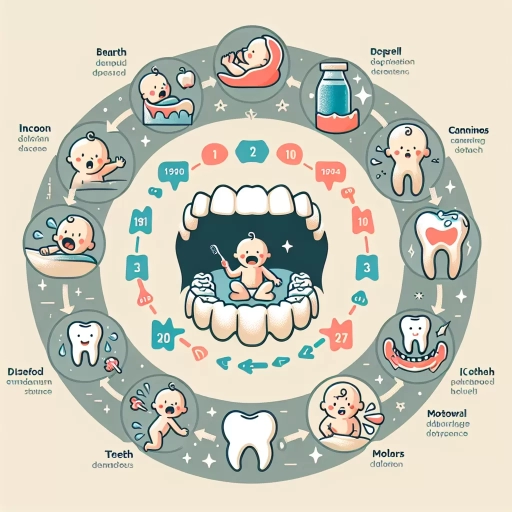How Long Does Teething Last

Understanding the Teething Process
The Basics of Baby Teething
On average, a baby begins to teeth between the ages of 4 to 7 months, although some can start as early as 3 months or as late as 12 months. The teething process is a natural development milestone and the time frame can vary significantly between children. It’s important to remember that teething is a process and each child is unique.
Timeline for Teething
The teeth usually emerge in a set pattern. Lower central incisors (bottom front teeth) are generally the first to come in, at roughly 4 to 7 months old. The upper central incisors (upper front teeth) follow, around 8 to 12 months. The lateral incisors come in next, followed by the first molars, the canines, and finally the second molars, which is typically completed around the age of 2 but could last until 3 years of age for some children.
Signs of baby teething
Common signs of teething include increased drooling, fussiness, and poor sleep. Your child might also have slightly swollen or red gums where the tooth is coming in, and you may even feel the cutting edge of the tooth if you rub your finger over the gum. Mild symptoms are natural and can be managed at home.
A Guide to Managing Teething Symptoms
Soothing Strategies for Teething
The discomfort caused by teething often leads to disturbed sleep and increased irritability. Several safe and effective strategies exist to alleviate this discomfort. Massaging the baby's gums with clean fingers, providing teething toys, or offering cold food (if the baby is old enough for solids) can provide some relief. These methods work by applying light pressure on the gums, which helps to numb the discomfort.
What to Avoid During Teething
Although it can be tempting to try anything that promises to soothe your baby's teething discomfort, certain practices should be avoided. For example, teething jewelry can pose a choking hazard and some over the counter teething products have ingredients that can be harmful to babies. Always consult your healthcare provider before using any remedies.
When to Consult a Pediatrician
While discomfort and irritability are commonplace during teething, certain symptoms may warrant a call to your pediatrician. If your baby has a high fever, refuses to eat or drink, or has diarrhea or other symptoms that seem unrelated to teething, it's important to consult your healthcare provider. Likewise, if your baby's teething seems to be causing severe pain or the discomfort lasts for too long, it's worthwhile to seek professional advice.
The Next Steps After Teething
Baby Oral Care
Once the first tooth appears, it's crucial to begin regular oral care. Even though baby teeth will eventually fall out, taking care of them is important to prevent tooth decay and to serve as placeholders for permanent teeth. Cleaning your baby's teeth every day, avoiding excess sugar, and starting dentist visits from the age of one are essential steps in this process.
Transition to Solid Foods
The transition to solid foods is another significant milestone that tends to coincide with the teething process. Understanding your baby's readiness for solids and introducing new textures and flavors gradually helps ensure the transition is smooth and enjoyable.
Speech Development
Teeth play a major role in your baby's speech and language development. Just as with teething, the timing of speech development can vary widely among children. Encouraging your baby to make sounds and say words, reading together, and responding to your baby's communication attempts can help foster their language skills.